Speech Day
Speech Day has been a mainstay of the Wellington College year ever since 1860; a chance to reward academic achievement, celebrate the life of the school, and welcome visitors. During the Second World War it was replaced by a scaled-down ‘Prize-Giving’ ceremony, but remained important.
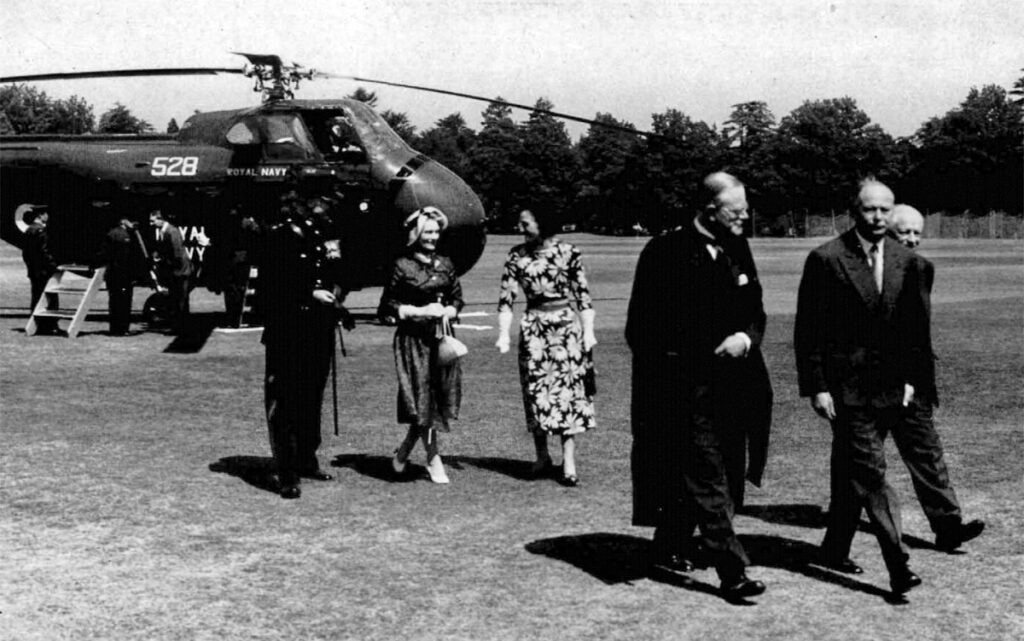
Although following a time-honoured tradition, the Speech Days of the 1940s and 1950s were products of their rather austere era, by no means as grand or lavish as those seen in Edwardian times or today. Nevertheless, they were a high point in the College calendar and memorable for many.
The Concert
The proceedings began with a school concert, held on the Friday evening before Speech Day. Then, as now, this was very popular.
‘A concert by the school orchestra and the singing (in dog Latin and with irreverent adaptations) of the College song.’ Alan Munro (Talbot 1948-53)
‘There was a concert, often quite entertaining. The College Prefects usually put on an amusing spoof act of some sort.’
Charles Ward (Hopetoun 1951-55)
Some more musical respondents had detailed memories of the event:
‘It was a big day for the orchestra, of which I was a member, and talented musical pupils often played the solo part in sometimes major classical works. On one occasion a boy violinist performed Svendsen’s Romance, a noteworthy event for me especially, owing to the fact that the boy was my brother John, four years my senior. At another year’s Speech Day Concert, César Franck’s Symphonic Variations was performed by one of the boys. The most noteworthy soloist, though, was Courtney Kenney, Mr Timberley’s star pupil, who played Beethoven’s 4th Piano Concerto.
Another major feature of the concert was the College Prefects’ song, with a short solo being sung by each Prefect. Those Prefects that couldn’t sing were eagerly anticipated and hilariously greeted. One such song that I particularly remember was for my final year when I (as I claim) suggested Dem Bones (“… dem bones gonna walk around…”). Courtney Kenney graciously agreed to accompany us, and we skipped across the stage for the upward connection and back the other way for the downward one. I remember it as well received.’ Peter Gardner (Hardinge 1946-51)
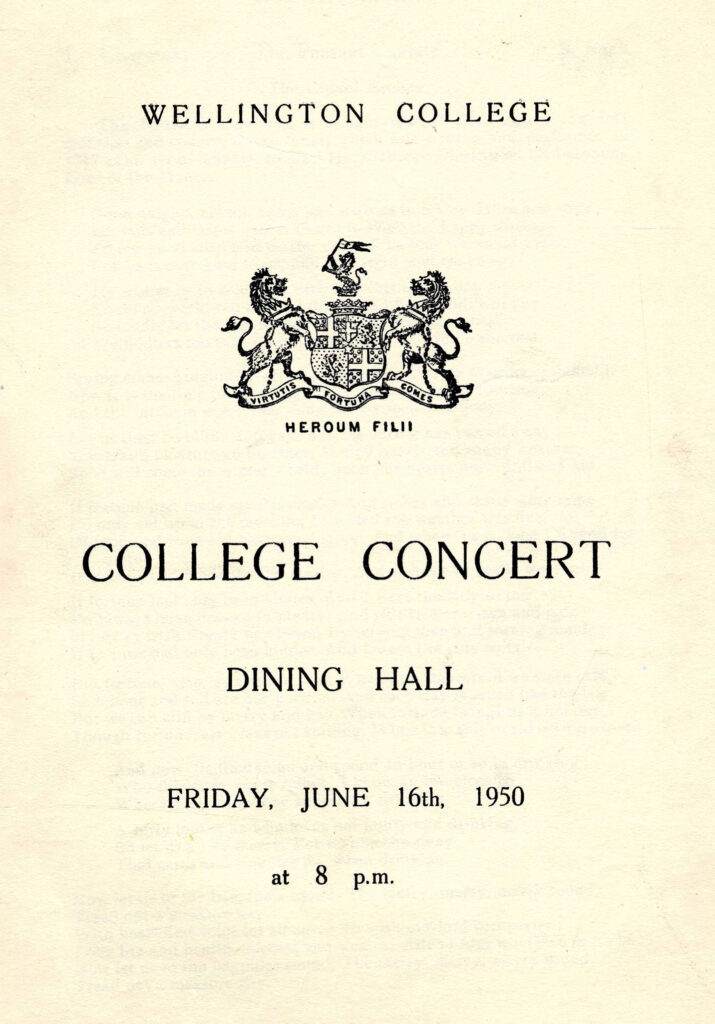
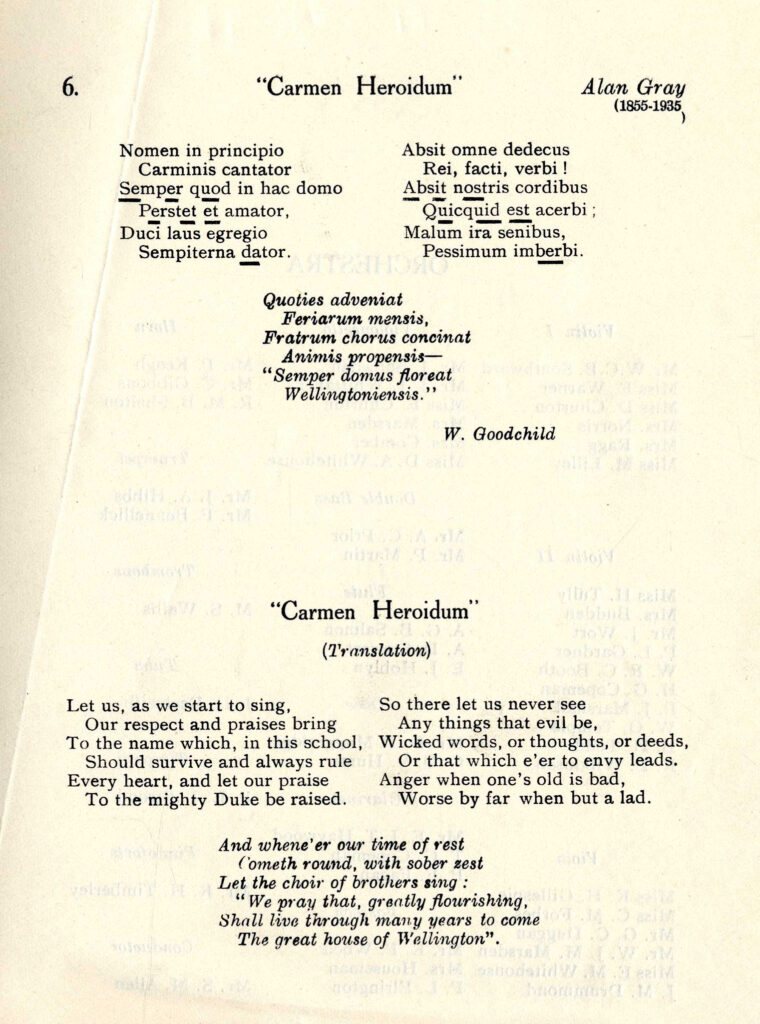
‘One year Royalton Kisch, a wealthy music lover who conducted occasional concerts by the big London orchestras without quite making the ranks of the eminent, took the baton from Maurice Allen and conducted us in the Radetsky March by Strauss. In other years I was the soloist in The Lark Ascending, and in the first movement of the Mozart Concerto in A major. In another, John Le Mare and I played the first movement of Fauré’s Dolly Suite.
The concert ended with a rousing rendition of the College Song:
“Nomen in Principio
Carminis cantator
Semper quod in hac domo
Perstet et amator
…..Semper domus floreat
Wellingtoniensis.” “Praise to the egregious Duke,” we sang.’ Michael Llewellyn-Smith (Orange 1952-57)
But one OW recounted something even more special:
‘I have one great and wonderful memory of Speech Day which has stayed in my mind for more than sixty years. There was always a concert the night before Speech Day, and in about 1952, there in the programme I saw that there was to be a piano performance by Mrs Potter. Now Mrs Potter was the wife of Arnold, and a very hands-on mother of about six young children. She was usually to be seen around their flat in Front Quad looking exhausted and fairly old. We knew the sight of her well. Then, at the concert, up stepped on the stage a beautiful young girl with long hair over her shoulders. Her hands touched the keyboard, and suddenly there was young life personified. The transformation was amazing and thrilling and I will never forget it.’ Mike Bolton (Hopetoun 1947-53)
A family occasion
It is probably hard for today’s Wellingtonians to appreciate that in the mid-20th century, parents rarely visited during term-time, and many students travelled to Wellington by train rather than being dropped off by car. Thus, Speech Day might be the only time that most parents saw the College from one year to the next.
It was this aspect which made the day memorable for many respondents:
‘Speech Day was always popular because you saw your parents… Mine used to come down once in the summer term, once in the autumn and not at all in the winter.’ Bertram Rope (Picton 1949-54)
‘Speech Day was usually the only day in the year I saw my parents at school, when they came down from Scotland.’
John Watson (Benson 1946-51)
‘My main memory is that it was the one day in the year my parents visited.’ Thomas Collett-White (Picton 1950-55)
‘During the War there were no exeats or half term holidays. For most of us, Speech Day was the only time that we ever saw a parent during term time. For that reason, it was a treat that we looked forward to with the utmost anticipation of pleasure.’ Hugo White (Hardinge 1944-48)
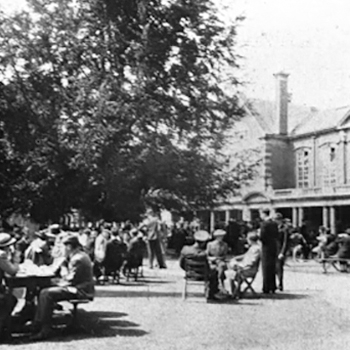
John Alexander (Talbot 1954-58) also enjoyed the ‘opportunity to show off your school to your parents. We visited all the exhibitions and watched the cricket on Turf,’ and added, ‘I don’t remember ever winning a prize, so probably never attended the speeches, but I never felt I had missed out.’
Likewise, Chris Heath (Beresford 1948-53) thought that ‘the students certainly liked having the chance to see their parents, and to show them where they lived and what they did.’
Peter Marshall (Stanley 1947-51) called the day ‘a nice occasion to see my parents and to be taken out to lunch.’ This aspect was remembered by others too:
‘Lunch was taken at a somewhat seedy hotel called the Iron Duke, or the Duke of Wellington, or some similar name. My impression is that the whole place was decorated in shades of brown, and that the food mirrored the décor.’ Hugo White (Hardinge 1944-48)
‘On Speech Day weekend my parents would stay locally. I was taken out for lunch on Saturday and Sunday, and tea.’
Charles Wade (Lynedoch 1947-50)
However, more people remembered their parents arriving with a picnic lunch, to be eaten on a rug on Turf:
‘I chiefly remember Speech Day for wonderful picnics on the edge of Turf, except once it rained so we picnicked in a classroom.’ John Watson (Benson 1946-51)
‘Speech Day was a great event, with parents and picnic lunch in the lovely grounds, and meeting friends’ parents.’
‘Bobby’ Baddeley (Picton 1948-52)
‘…seeing lines of picnics down the Kilometre.’ Stuart Dowding (Talbot 1957-61)
Richard Godfrey-Faussett (Anglesey 1946-50) recalled that the picnics were ‘as lavish as possible…’ Some boys were perhaps sensitive to the social differences on display here, as Adrian Stephenson (Talbot 1957-61) described ‘a picnic which was never particularly elaborate in our case!’
Likewise Rodney Fletcher (Combermere 1949-53)’s main memory of the event was ‘My parents arriving late in the oldest car,’ and Andrew Dewar-Durie (Talbot 1953-56) wrote that ‘My main concern at Speech Day was what my mother would be wearing, especially her hat, and would it cause me embarrassment?’
Others had more confidence in the impression made by their parents:
‘I remember the mothers’ hats, as it was always the last day of Ascot week, so everyone looked so smart.’ David Simonds (Orange 1941-46)
‘…Mother, dressed up to kill and driving her Armstrong Siddeley!’
Robin Lake (Benson 1952-57)
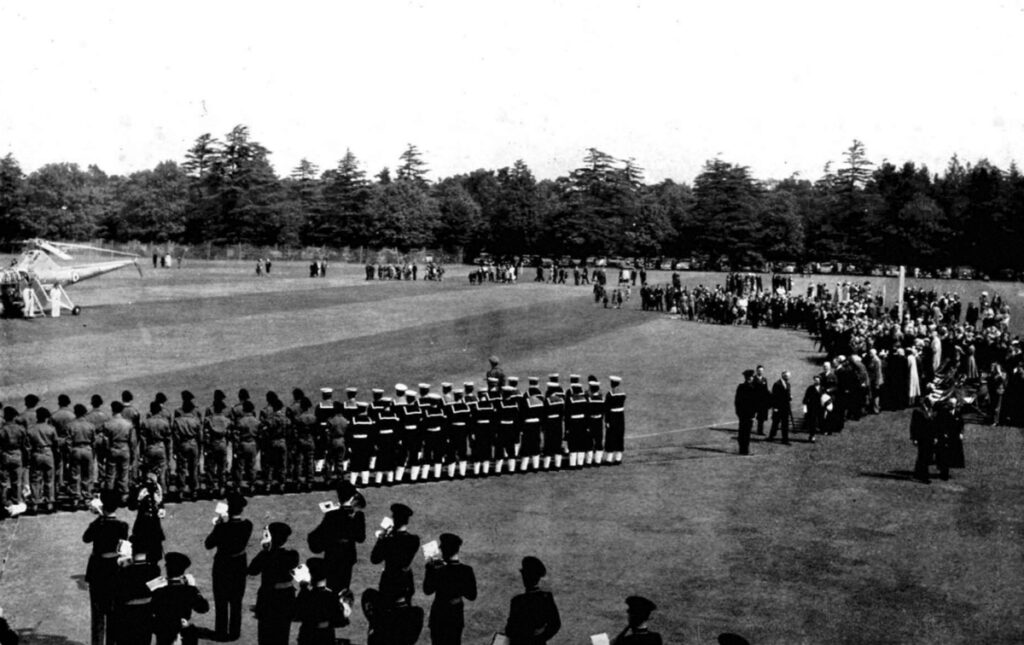

Parents were not the only guests who attracted attention:
‘For some reason, it was important for one’s sister to be dressed in the height of fashion.’ Richard Godfrey-Faussett (Anglesey 1946-50)
‘Families visited – some of us used to try to spot the prettiest sisters!’
Charles Ward (Hopetoun 1951-55)
‘Speech Day was parentless for me [his parents being overseas], and the main occupation was checking out the sisters of my friends.’ William Young (Anglesey 1954-58)
However, it was a younger sister who was remembered by Roger Ryall (Picton 1951-56) in this amusing anecdote:
‘My mother and my friend George’s mother got together on one of those wet tedious Speech Days that we endured in the 1950s. This one was greatly enlivened by George’s sister, who must have been about twelve years old at the time. She attended a school run by nuns. Somehow, to George’s mother’s horror, she manipulated the conversation to the subject of what the nuns wore under their habits.
Now, twelve-year-olds are quick to sense when they are winning, and George’s sister knew that she was on top. The more dismayed her mother became, the more loudly she expounded on the subject of the nuns’ underwear. She really was very funny indeed and everyone in hearing range was in fits of laughter, including my own mother. We are often told that the benefit of attending a school like Wellington is that it gives you a broad education. It also explains how I, who went to a robust boys’ school in the 1950s, can expound with considerable expertise on the subject of nuns’ knickers.’
Not enjoyed by all
Although a majority had positive memories, a sizeable group of respondents were less than enthusiastic about Speech Day:
‘I don’t recall Speech Day as being memorable.’ Nick Harding (Combermere) 1951-1955
‘It never seemed particularly special.’ Adrian Stephenson (Talbot 1957-61)
‘A pretty dull affair at that time.’ Peter Davison (Beresford 1948-52)
‘I found Speech Days very boring.’
Hardy Stroud (Combermere 1950-55)
A “jolly,” but probably more fun for OWs.’ John Flinn (Combermere 1944-49)
For some, this lack of enthusiasm was, understandably, due to the absence of their parents:
‘I don’t remember any particular Speech Days. My parents rarely came, due to petrol rationing.’ John Hoblyn (Hardinge 1945-50)
‘I remember only one Speech Day. My parents did not come. I volunteered to be a waiter for afternoon teas in a marquee on Turf.’ Tim Reeder (Picton 1949-53)
One anonymous OW gave more thought to this feeling:
‘I never much enjoyed Speech Days – they were a bit “clannish,” and therefore no doubt more fun for those with living relations who had been at the school, and could come back and get together with their old pals. For those of us with few, or dead, OW relations, it was a bit alienating.’
In these years following the Second World War, others also found this to be true:
‘On one occasion my father (OW), after wandering round the various memorials with my godfather (also OW), rejoined my mother and myself and said gloomily about their contemporaries, “They are all dead.”’
William Field (Lynedoch 1952-56)
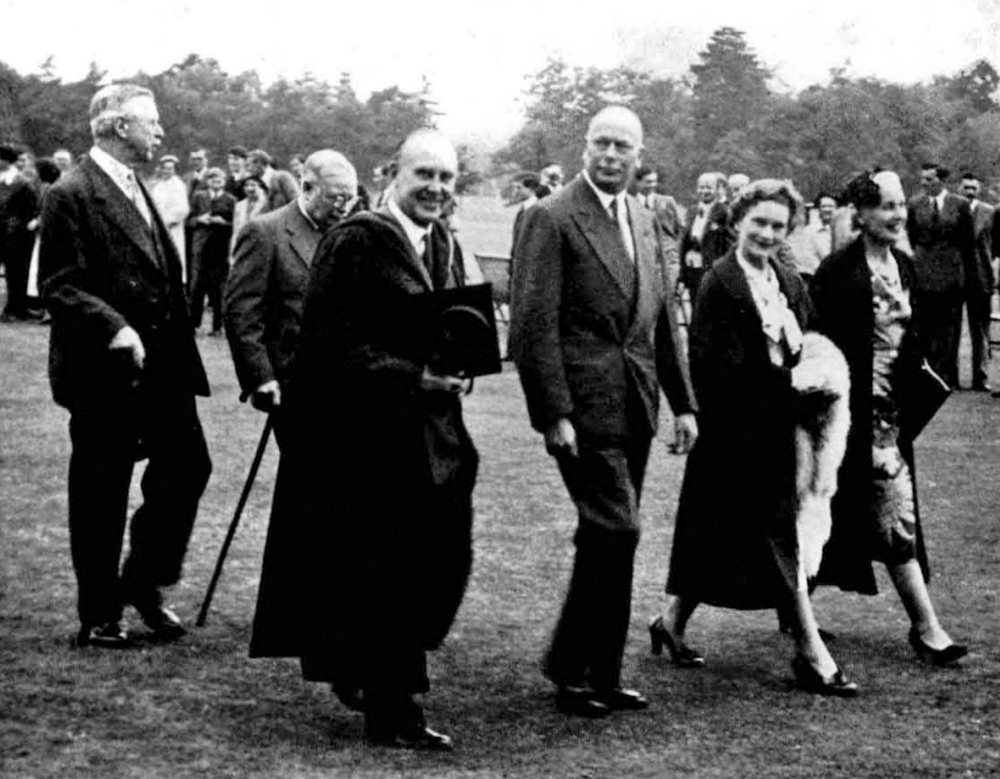

VIPs and the Guard of Honour
Speech Day was usually attended by a guest of honour. Often in the 1950s this was the College President, the Duke of Gloucester.
The Duke’s mode of arrival was an unusual one for the time:
‘I seem to remember one Speech Day where the Duke of Gloucester arrived on Turf by helicopter.’ Anthony Collett (Combermere 1953-58)
‘One highlight was the arrival of the Duke of Gloucester, sometimes by helicopter, which was allowed to land on Turf.’
Richard May-Hill (Hopetoun 1957-61)
The guest of honour would then proceed to inspect the Corps:
‘We [the Corps] were good on parade and smart for Speech Day, when a rather bored Duke of Gloucester would inspect after a late night at the Ascot Ball! ‘Bobby’ Baddeley (Picton 1948-52)
‘There was endless drill practice before this event, and we were all scared of dropping our rifle or turning left instead of right.’
John Alexander (Talbot 1954-58)
‘I remember taking part in the guard of honour for the Duke of Gloucester on Speech Day 1943. For this, we had to learn the esoteric art of forming fours, long since out-of-date as far as we were concerned. There is one photograph of that guard, taken from an upper balcony on the South Front and therefore looking down on the guard from behind, which I completely spoil! Being tall I found myself right-hand man of the rear rank; being stone deaf in my left ear, I was terrified of missing the words of command coming from the centre front, to my left; the photograph shows every head looking rigidly to the front except mine. Mine, of course, was inclined slightly to the left in the hope of hearing the commands with my right ear!’ Robert Longmore (Combermere 1938-43)
Prizegiving and the speeches
Those boys fortunate enough to win a prize would attend the prizegiving ceremony, generally held in Old Hall, where they would hear speeches from the Chairman of Governors, the guest of honour, and the Master.
For some, this could be very meaningful:
‘My own most vivid memory is the Speech Day of 1956, when, with my parents present, I was presented by the Duke of Gloucester with both the Walter Castle Prize and the Queen’s Medal, both of which I treasure to this day.’ Anthony Bruce (Benson 1951-56)
Others felt that they had ‘missed out’ for various reasons:
‘Thanks to the Music Scholar being denied the opportunity for a piano prize as a result of being second by the skin of my teeth, I was presented with the Oxford Book of English Verse by the Germanic-looking Duke of Gloucester.’ David Nalder (Orange 1949-53)
‘The only Speech Day I remember was the one where I was in the San, which was disappointing since my parents had come over from Berlin to witness their offspring receive the John Falconer Prize, my only shining moment in the Wellington academic firmament. The Master kindly allowed me to spend a night away once I had recovered.’ William Young (Anglesey 1954-58)
The speeches themselves did not rouse much enthusiasm among the boys:
‘The speechifying passed over my head and was something to be endured.’ Peter Marshall (Stanley 1947-51)
‘We heard some conscientious if hardly awe-inspiring speeches from the Duke of Gloucester, and perhaps the Duke of Wellington, followed, of course, by the Master.’ Douglas Miller (Benson 1951-56)
But they could be memorable for other reasons:
‘The Duke of Gloucester dropped his speech notes, which were retrieved by the Head Boy, but not handed back in the right order, resulting in his confusion and much mirth from boys.’
George Nicholson (Hardinge 1949-54)
‘One recollection is of General Sir Ian Hamilton, of Gallipoli fame and the oldest OW then living, addressing us during lunch from the gallery. In particular, he told us how lucky we were to have two hot baths a week – in his day it was two a term!’ Robert Longmore (Combermere 1938-43)

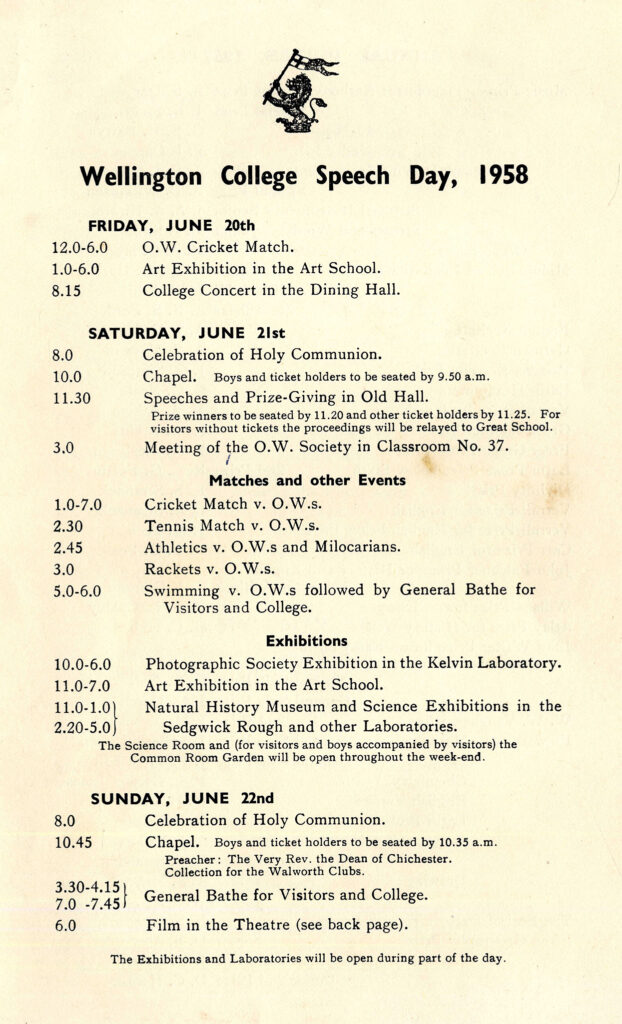
Other activities
Those not attending the prizegiving had more time to enjoy the day’s other activities, such as exhibitions and sporting events. Good weather made all the difference!
‘We had paintings displayed in the Art School… If it was sunny, most visitors said how lucky I was to be in such beautiful surroundings.’ Nigel Hamley (Hill 1952-55)
‘Speech Days were a good break in the long summer terms, and busy with matches, exhibitions (we showed off our hand-raised badger cubs), picnics and visiting families.’ Norman Tyler (Hill 1947-52)
‘I remember various exhibitions, particularly the Art exhibition which was extensive and showed some good work.’ Charles Wade (Lynedoch 1947-50)
‘There were various sporting activites against OW teams – the main one cricket on Turf, with spectators coming and going.’ Charles Ward (Hopetoun 1951-55)
‘There was a cricket match, and a colourful parade of visitors.’ Robert Wilkinson (Anglesey 1947-50)
‘It became a bit more interesting in my last two years when I was playing cricket in the two-day match against the OWs.’
Adrian Stephenson (Talbot 1957-61)
‘… the cars parked round Turf while we were playing cricket and they were supping champagne and tasty morsels.’ Graham Stephenson (Combermere 1953-57)
‘Speech Day was always sunny and with lots of people!’ Michael Hedgecoe (Combermere 1951-54)
Those in the Benson remembered a particular ending to the day:
‘With parents present, one visited the various exhibitions, ate a picnic lunch on Turf and/or (in my case) had to take part in some athletics events against the OWs on Rockies. Then followed tea in the Benson garden…’ Anthony Bruce (Benson 1951-56)
‘Exhibitions, prize-giving, and tea at the Benson.’ John Thorneycroft (Benson 1953-58)
‘We mooched around, watched the cricket on Turf, and went down to the Benson for tea.’
Douglas Miller (Benson 1951-56)
Callover and leaving
A considerable part of Speech Day’s appeal lay in the time off school which it afforded.
Taking place on a Saturday, it meant, in the words of Charles Ward (Hopetoun 1951-55), ‘No Saturday morning school!’ and furthermore it was followed by one or two nights out of College. Alan Munro (Talbot 1948-53) recalled the day ending, as it does now, with a Callover, but this was not mentioned by any other respondents. They did, however, remember the exeat:
‘Bearing in mind we had few leave-outs when one could stay out overnight, Speech Day was a big day. For those not actually receiving prizes or taking part in sports, we rather looked forward to it all being over and getting away.’ Richard Craven (Hill 1950-54)
‘It was fun and lovely to have the prospect of a weekend at home afterwards. My parents, who lived in Wiltshire, only came to see me at College on Speech Day. Normally I did not leave College at weekends, unless invited out by one of my friends whose parents lived close by.’ Christopher Stephenson (Hill 1949-54)
Indeed, of Speech Day as a whole, Nigel Hamley (Hill 1952-55) remembered
‘Very little, except that we got to go home for 24 hours!’